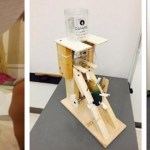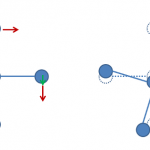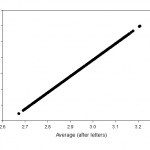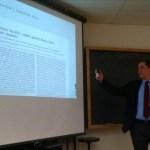Science
The editor at Forbes suggested I should write something about the re-start of the Large Hadron Collider, so I did. But being me, I couldn't just do an "LHC, yay!" post, but talk about it in a larger context, as one of three major approaches to filling the gaps in the Standard Model:
The big physics story over the weekend was the re-start of the Large Hadron Collider at CERN, the world’s largest and highest-energy particle accelerator. It was initially started in 2008, but some key circuits failed shortly after it was switched on. A relatively quick patch job allowed it to operate at half its…
Last week, Steven Weinberg wrote a piece for the Guardian promoting his new book about the history of science (which seems sort of like an extended attempt to make Thony C. blow a gasket..). This included a list of recommended books for non-scientists which was, shall we say, a tiny bit problematic.
This is a topic on which I have Opinions, so I wrote a recommended reading list of my own over at Forbes. I'm more diplomatic about Weinberg than Phillip Ball was, but I have ego enough to say that I think my list is way better...
I won't pretend that it's a truly comprehensive list, though, so…
Recent articles in The Daily Mail and The Australian reminded me that it's been over a month since the unfortunate demise of Jess Ainscough, a young Australian woman who was diagnosed with an epithelioid sarcoma of her left upper extremity in 2008. Before I get to the articles, a brief recap is in order.
This is a very rare tumor that is generally slow growing but relentless, with most untreated patients dying within 10 years, although with radical surgery and complete removal of all tumor deposits it is possible to produce ten year survivals on the order of 49-72%, closer to 72% for young…
Why, oh why, did I look at GreenMedInfo again?
You remember GreenMedInfo? It's yet another wretched hive of scum and quackery, but with a twist. Its proprietor, Sayer Ji, thinks he's an expert at interpreting the biomedical literature. Unfortunately, as he demonstrates time and time again with depressing regularity, he is nothing of the sort. In reality, what Ji is an expert at is cherry picking medical studies and torturing them until they confess agreement with whatever quack idea he's currently espousing. In the wake of the news coverage of Angelina Jolie's decision to have her ovaries…
A few years ago, I taught one of our "SRS" classes, which are supposed to introduce students to research at the college level-- I blogged about it while the course was in progress. I taught it again in the recently-concluded Winter term, but didn't blog much about it because I was mostly doing the same stuff as last time. I did re-adjust the content a little, as I've changed some things about the way I like to present stuff since 2012, but they were mostly cosmetic tweaks, with one big exception.
In the previous round, I went with the base course description, which just specifies that…
Everybody and their extended families has been sharing around the Fareed Zakaria piece on liberal education. This, as you might imagine, is relevant to my interests. So I wrote up a response over at Forbes.
The basic argument of the response is the same thing I've been relentlessly flogging around here for a few years: that while I'm all for a broad education, the notion that studying a STEM subject and studying "the human condition" are in opposition or even cleanly separable is just foolish. But it's a great excuse to start that argument at Forbes, so...
As I sat on my couch last night, laptop sitting in front of me, I awaited the Ken Burns adaptation of Siddartha Mukherjee's excellent book The Emperor of All Maladies into a three part television documentary to air on PBS. I'm not sure whether I'll blog the show or not, but if I do I'll probably wait until all three episodes have aired. In the meantime, this seems as good a time as any to go back to a story that I saw a week ago but somehow, thanks to grants, traveling to Houston, and other distractions that I wanted to blog about more, never got around to. Since The Emperor of All Maladies,…
I hinted once or twice that I had news coming, and this is it: I've signed up to be a blog contributor at Forbes writing about, well, the sorts of things I usually write about. I'm pretty excited about the chance to connect with a new audience; the fact that they're paying me doesn't hurt, either...
The above link goes to my contributor page there, which will be your one-stop-shopping source for what I write at Forbes. There are two posts up this morning, a self-introduction, and an attempt to define physics and what makes it unique. The "Follow" button has an option for an RSS feed; this isn…
That's the title of the talk I gave yesterday at Vanderbilt, and here are the slides:
Talking Dogs and Galileian Blogs: Social Media for Communicating Science from Chad Orzel
The central idea is the same as in past versions of the talk-- stealing Robert Krulwich's joke contrasting the publication styles of Newton and Galileo to argue that scientists spend too much time writing technical articles aimed at an audience of other experts, and need to do more "Galileian" publication aimed at a broad audience. And that social media technologies offer powerful tools that can enable those who are…
Homeopathy is quackery. It can't be repeated often enough.
Homeopathy is The One Quackery To Rule Them All. It is based on prescientific vitalism and principles so addled that one must wonder whether Samuel Hahnemann, the guy who dreamt up this medical system, was a fan of excess alcohol use, opium, marijuana, or some unholy combination of the these. Think about it. The first principle of homeopathy is the law of similars, which states that like cures like. In other words, to relieve a symptom, homeopathy tells us, you must use something that causes that symptom in healthy people. There is no…
I mentioned last week that I'm giving a talk at Vanderbilt tomorrow, but as they went to the trouble of writing a press release, the least I can do is share it:
It’s clear that this year’s Forman lecturer at Vanderbilt University, Chad Orzel, will talk about physics to almost anyone.
After all, two of his popular science books are How to Teach Physics to Your Dog and How to Teach Relativity to Your Dog. Orzel, an associate professor of physics at Union College in New York and author of the ScienceBlog “Uncertain Principles,” is scheduled to speak on campus at 3 p.m. Thursday, March 26.
As…
Yesterday's post about VPython simulation of the famous bicycle wheel demo showed that you can get the precession and nutation from a simulation that only includes forces. But this is still kind of mysterious, from the standpoint of basic physics intuition. Specifically, it's sort of hard to see how any of this produces a force up and to the left, as required for the precession to happen.
I spent a bunch of time last night drawing pictures and writing equations, and I think I have the start of an explanation. It all comes down to the picture of rigid objects as really stiff springs-- the grey…
Two things have reminded me that it's been a while since I've written about Stanislaw Burzynski, nearly five months, to be precise. First, on Wednesday evening I'll be heading to the city where Burzynski preys on unsuspecting cancer patients, Houston, TX, to attend this year's Society of Surgical Oncology meeting to imbibe the latest research on—of course!—surgical oncology. (If you'll be attending the meeting, look me up. If you're in Houston and want to have a meetup, I might be able to pull it off.) Second, you, my readers, have been telling me there's something I need to blog about. This…
The third of the great physics principles introduced in our introductory mechanics courses is the conservation of angular momentum, or the Angular Momentum Principle in the language of the Matter and Interactions curriculum we use. This tends to be one of the hardest topics to introduce, in no small part because it's the last thing introduced and we're usually really short on time, but also because it's really weird. Angular momentum is very different than linear momentum, and involves all sorts of vector products and things going off at right angles.
This leads to some of the coolest demos…
We'll be accepting applications for The Schrödinger Sessions workshop at JQI through tomorrow. We already have 80-plus applicants for fewer than 20 planned spots, including a couple of authors I really, really like and some folks who have won awards, etc., so we're going to have our work cut out for us picking the attendees...
We're also discussing the program for the workshop-- more details when we have something more final-- which has me thinking about good examples to use of storytelling involving quantum physics. I'd like to be able to give a few shout-outs to already-existing fiction…
Yesterday's quick rant had the slightly clickbait-y title "GPAs are Idiotic," because, well, I'm trying to get people to read the blog, y'know. It's a little hyperbolic, though, and wasn't founded in anything but a vague intuition that the crude digitization step involved in going from numerical course averages to letter grades then back to multi-digit GPA on a four-point scale is a silly addition to the grading process.
But, you know, that's not really scientific, and I have access to sophisticated computing technology, so we can simulate the problematic process, and see just how much…
I was thinking about something only tangentially related to grading, when it struck me that the way we go about generating student grade point averages is the kind of mind-bogglingly stupid system that requires lots of smart people working together to produce. Two very different groups of smart people, with very different ways of looking at the world.
As a scientist, the starting point for assigning grades is generally a set of scores on a bunch of individual assessments. These are generally combined to form some sort of weighted average, which can be expressed as something like a percentage…
I keep forgetting to mention these, but I have two talks coming up:
1) Tonight, March 17, I'm talking about Eureka to the Mid-Hudson Astronomical Association on the campus of SUNY New Paltz. This is a version of the talk I gave in Bristol, UK over the summer, but with the soccer content replaced with American football.
2) Next Thursday, March 26, I'll be giving a Forman Lecture as part of the Vanderbilt University Physics Colloquium (following in Rhett's footsteps...). This is going to be a revised version of the social-media talk I've given in the past. I need to blow that up and put it back…
It's always a pleasure to see former students doing well, and to that end, we invited one of my former thesis students, Mike Mastroianni, class of 2007, to give a colloquium talk last week in the department. Mike went to physics grad school for a couple of years after graduation, but decided he was more interested in education issues, and is now in the process of writing his dissertation (to be defended in a few weeks) in a Curriculum and Instruction program at the University at Albany.
He gave a really interesting talk on his thesis work, looking at the evolution of gender ratios in STEM…
It's winter, and as usually happens in winter, I'm having a hard time opening the gate to our back yard. Why? It's not the snow, it's physics.
We have a standing policy that as much as possible, Emmy goes in and out through the back door for walks and small-animal-chasing in the backyard. This has occasionally been lifted, when a tree limb fell on our back gate, and when they were building the deck, but for the most part, when we had to go in and out through the front door, but she mostly knows not to go charging out the front door, which is the whole point.
Access to our fenced back yard is…










